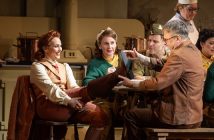Les Misérables has been playing on the West End since for 23 years, Phantom for 22. Chess hasn’t been in the West End for over 30, last playing in 1989, before I was even born. My sister described it as a musical for those that want to prove they know more than just the most famous, and there is no real risk of Chess hitting the mainstream any time soon. A play with a four-column synopsis is never going to be an easy story to keep track of.
Chess as a metaphor is a classic literary trope whether it represents life, relationships, sex, or here, the complex post-Cold war international political situation. Of course. It is a product of the 1980s from the music to the costumes, the sound effects and the political treatment… There are a few ensemble set pieces that bring to life the locations for the chess tournaments – Merano and Bangkok. They are ostentatious, vibrant and regretfully, problematically racist. I struggled to enjoy them as I tried to understand whether they were performed with a self-conscious self-deprecation or complete seriousness. At the end of the play I still couldn’t tell you which.

The Coliseum is a difficult stage without the structure of a traditional proscenium, however the geometric monochrome of the chess board is an effectively striking backdrop to the action. There are neon gauze checkerboard squares, an oversize hydraulic grate that serves to ensconce the sounds of the ENO chorus, a shadow style illustration to tell the story of the history of chess and real-life footage of the space race. However, it is not a huge space, and yet for some reason there are two large screens on either side of the stage as if we are at a rock concert, and the cast are trailed by three or four camera men at all times. We could make all sorts of analogies for fame, the troubles of the media, but really my main question is why? I spent more time wondering which camera was where on stage vs the screens rather than attempting to unravel the moves of the game.
The leads do their best with characters that are two-dimensional at best. The action lurches along with few questions asked even when seemingly dramatic changes occur. All give solid performances, give or take some piercingly high notes, with a difficult score and troubled sound that occasionally masks Tim Rice’s complex lyrics. The ENO orchestra provide a soaring backdrop to the cast with a score that has some really beautiful moments.

Michael Ball is masterful in any role that he plays, albeit the story fails to get going until the storming songs at the end of the first act. As he descends on the chess board, arms aloft, at the end of ‘Anthem’, you can forgive the self-indulgence with the hope that this is the shape of things to come. His wife Svetlana, played by the beautifully voiced Alexandra Burke, is given a few more songs from international performances but has little character apart from a melancholic staring in to the middle distance. And just when the songs pick up and the action starts to move with a refreshing pace, the curtain fails. To say the pacing is a struggle – given that there are two games of chess painstakingly played in real time – is an understatement.
Towards the end I found myself questioning whether I had any particular interest in post-cold war political relations and whether it was that which failed to pique my interest… but then again neither the Vietnam war or nineteenth-century French rebellion have ever been top of my list either. At least with those I came out with songs to sing and a sense of a story being told, with Chess I was left just a little bit cold.
Chess at the London Coliseum until 2 June 2018. Running time 2 hours 45 minutes. For more information and tickets please visit the website.




